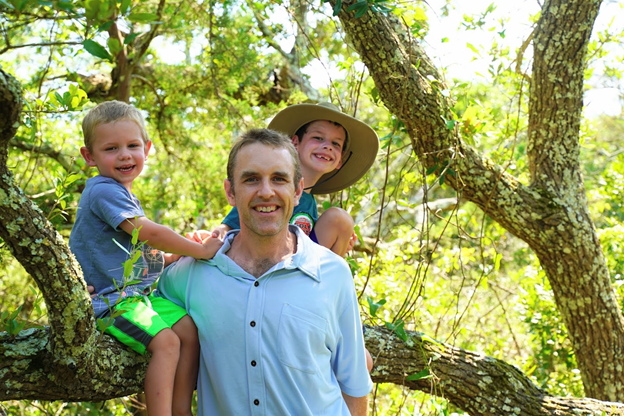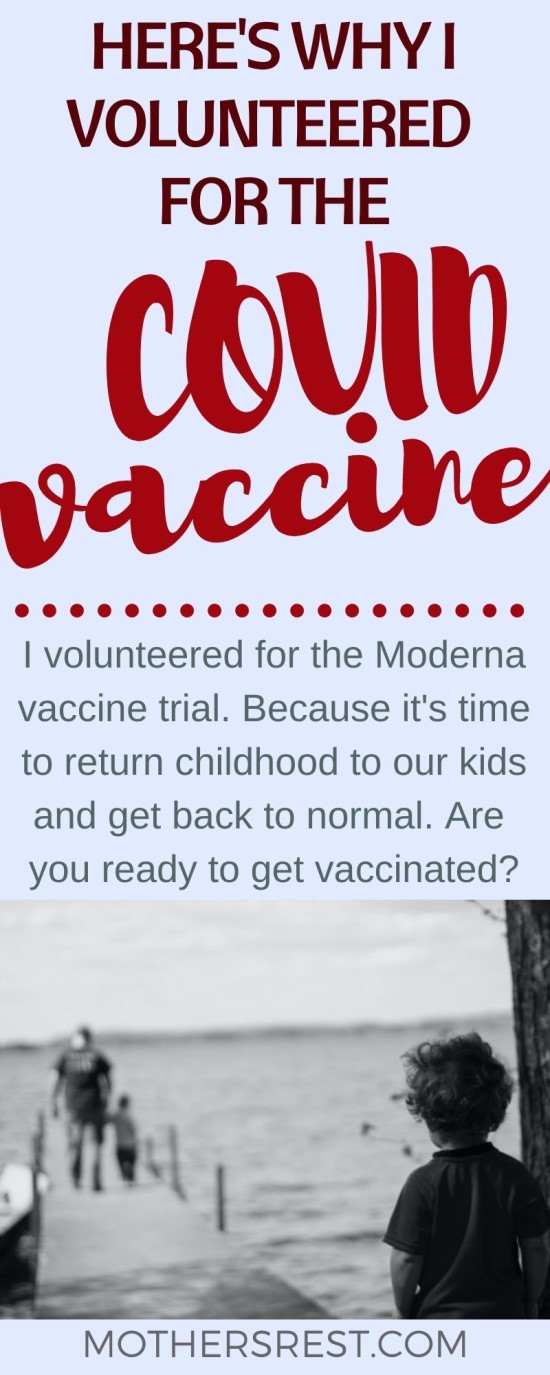By Clint Morse, guest blogger
We have two little boys (seven and four years old). I will do anything to raise my kids to be happy, healthy, and productive. As with everyone, my kids’ development was interrupted by COVID.
As a parent, this has been extremely difficult. I felt powerless for months. But not anymore.
If we all do our part, we can return childhood to our children.
My part included taking the risk of unknown side-effects in an experimental vaccine trial. While that may be an unnecessarily high risk for most, we can all make educated decisions to return life to normalcy. I won’t pretend to be as knowledgeable as a doctor, an epidemiologist, or a researcher writing for The New England Journal of Medicine, but here’s my experience – and the reasoning that led me to the Moderna vaccine trial.
Doing my research
Before volunteering, I read everything.
I read opinion pieces on networks ranging from CNN to Fox News. I read peer-reviewed and observational papers (to the extent that I could understand them) in Science, Cell, and The Lancet.
After digesting as best as I could, I developed my own opinion – that life will get back to normal when:
1. Science reduces the risk of COVID to an acceptable level
2. We understand that the COVID will never be eliminated
3. We take an approved vaccine when it’s available
COVID’s here to stay
The first two points are interrelated.
Humanity seldom eliminates highly contagious respiratory illnesses like COVID. Rather, the reduction in risk has historically been through a series of incremental improvements in treatment and prevention. (If you’re interested in this, I recommend researching the history of tuberculosis in the US.)
Recognizing that we are unlikely to zero out the risk, we need to define our true risk tolerance.
For example, the seasonal flu results in hundreds of thousands of hospitalizations and between 10,000 and 80,000 deaths per year in the US. Our kids should be able to return to childhood when COVID’s risk drops to a level equivalent to the seasonal flu.
We aren’t that far off in relative terms. COVID’s real mortality rate isn’t known. Some studies set the mortality rate as low as 0.3%. The majority view pegs the mortality rate around 0.6%. The seasonal flu generally has a mortality rate around 0.1%.
We have two bullets capable of reducing the risk: TREATMENTS AND VACCINES.
Treatments are promising
Studies on new treatments are being released every day. Steroids have been shown to greatly reduce mortality. While I don’t understand the science behind this, studies of the arthritis drug Olumiant show a 35% reduction in mortality among hospitalized patients.
Eli Lilly’s monoclonal antibody cocktail has shown amazing results: an 84.5% reduction in hospitalizations if taken early enough! If that result proves true in the general population (and Lilly and Regeneron can manufacture sufficiently to meet demand), monoclonal antibodies may reduce the COVID risk to an acceptable level.
That said, I don’t want to get sick. Period.
The vaccine is on its way
Before we eliminate the fear that keeps people from returning to life, we need a vaccine that will save people from getting extremely sick in the first place.
The cavalry is coming.
Pfizer just released its Phase III results showing that its vaccine is at least 90% effective. Moderna’s results are due any day, and its results are expected to show efficacy at the same level as the Pfizer vaccine.
I’m not concerned by the speed of development of the vaccine.
Historically, vaccines have taken years to develop because trials are very expensive, and volunteers for experimental treatments have been rare. Moreover, researchers had to grow virus and related matter in eggs. That growth process alone takes a long time, especially to develop enough experimental material for a large scale trial.
Comparing the development of the COVID vaccines to historical efforts simply isn’t apples-to-apples.
Pharmaceutical companies have had more than enough volunteers (although people of color are underrepresented in the studies). The US Government and others provided billions of dollars, covering most of the costs for development and trial. And, genetic engineering (like the Moderna and Pfizer messenger RNA vectors) can eliminate most of the time associated with manufacturing large quantities of vaccine for trials.
Let’s talk about antibodies
What’s more concerning than the speed of development is studies showing your COVID antibodies quickly go down. This means your immunity wears off fast and you can get reinfected.
But this doesn’t phase my enthusiasm either.
For every concerning study on reinfection, there’s another study showing why reinfection is rare. Also, a vaccine can work in two ways:
1. Reducing infection altogether
2. Training our memory cells to react quickly enough to prevent severe infection
By taking the vaccine, our bodies should quickly develop antibodies that prevent illness. The vaccine should also teach our memory cells to recognize COVID and react quickly to prevent severe infection once the neutralizing antibodies dissipate.
In other words, even though we are unlikely to prevent infection altogether for extended periods of time with a single vaccine dose, we should be able to dramatically increase the percentage of the population that is asymptomatic.
Then I volunteered
To that end, I jumped at the opportunity to volunteer for the Moderna Phase III trial, which involves TWO shots.
As to my experience, I was very nervous the entire first day. I got poked and prodded for 3 hours (blood work, multiple temperature checks, multiple blood pressure checks, and a COVID nasal test). And, the doctors almost read the 20-page waiver word-for-word before they would enroll me in the study.
Once enrolled, I either received a shot of the vaccine or a placebo (as explained below, I now know that I got the vaccine). The doctors told me that if I received the placebo and the vaccine is approved, the blinded study would end so that I could be inoculated with the real vaccine.
I had to wait an hour under observation before I could leave the clinic.
Then, for several weeks, I had to log any symptoms I might have on my phone.
Taking the first shot
The relatively known potential side effects are headache, pain at injection sight, fever, chills, and nausea.
On day 1, I was extremely light headed. This could have been a side effect. This could also have been adrenaline and excitement from participating in the study.
On day 2, it felt like someone reached back and slugged my arm as hard as they could.
After that, I felt totally back to normal.
I didn’t have any other symptoms from the first shot. Basically, it was like getting a routine tetanus shot. One week after receiving the vaccine, I ran an ultramarathon.
I was fine.
Getting the booster
One month later, I received a booster shot.
There have been numerous reports of moderate side-effects with the booster. I was no different.
My arm got very sore almost immediately. Twelve hours later, my fever spiked to 102.
I certainly felt fatigued for about 30 hours (although I did work from home through it all).
Similar to the other reports, I felt back normal within 48 hours.
I’ve got COVID antibodies
A few days later, I took a blood test for COVID antibodies. As expected, the test came back positive.
I was – AND AM – super excited. For me, the vaccine worked as anticipated.
I am now immune! (For some reasonable period of time.)
Scientists will monitor my blood antibody levels for the next two years to determine how often I’ll need another COVID booster shot. Most expect that we humans will need to get a yearly COVID vaccine. Just like getting a yearly flu shot.
The Vaccine is coming – FAST!
The Pfizer and Moderna safety results will be ready within days.
Emergency use authorizations should be approved by early December.
Millions of doses should be available for the highest risk populations (frontline workers, the elderly, people with comorbidities) no later than the end of the year.
Teachers should be vaccinated in early 2021.
The general population should be vaccinated by Q2 or Q3 2021.
In short, effective vaccines and treatments are basically here. We’re potentially just months away from returning to normalcy. But, it’s up to us to lift out of 2020.
We don’t all need to bear the risks in experimental studies. We do, however, need to educate ourselves to avoid being overwhelmed by fear. If we take the vaccine when it’s approved and make educated choices concerning reasonable levels of risk tolerance, we can raise out of the 2020 and do this together.
Are you planning to get the COVID vaccine? Comment below or on Facebook at MothersRest.
Photo credit, featured image: Photo by Katherine Chase on Unsplash
About the guest blogger:
Clint met his lovely wife years ago at JMU. (Let’s go, Dukes!) He’s now a civil litigator focused on bankruptcy litigation, and his wife specializes in financial analysis. Most importantly, they are busy raising their two young sons. While life is hectic, they wouldn’t have it any other way. He also loves running.



I am particularly interested b/c my husband (military) will no doubt be among those required to be first in line. It is encouraging to hear a personal account. While, yes, it will take years to know long term effects, some will be required to take it no matter.
Give him a hug of thanks for me!
As always, it is THE LONG TERM EFFECT that will show the negative secondary effects of the vaccination. Time will tell…
Yes, time will tell. Fingers crossed!!
I believe we are seeing the long term affects of generational vaccines in the explosion of autism cases
Here’s a great resource from the CDC about vaccines and autism: https://www.cdc.gov/vaccinesafety/concerns/autism.html
Thank you for your selflessness and for your participation in this study. You, the researchers, manufacturers and all the other volunteers are the heroes who are saving lives and allowing us to soon return to life as normal again. I plan to be vaccinated when possible, l’d had reservations but now have confidence that it’ll be beneficial and okay.
Thank you for your kind, powerful words.
Yes I am planning on getting the vaccine.
Thanks so much for doing your part to stop COVID!